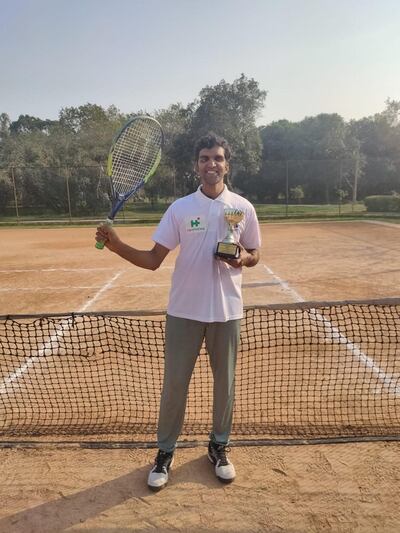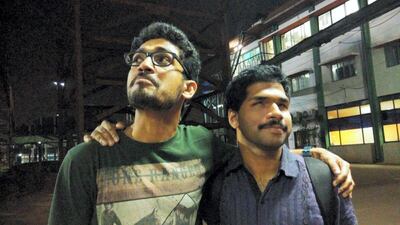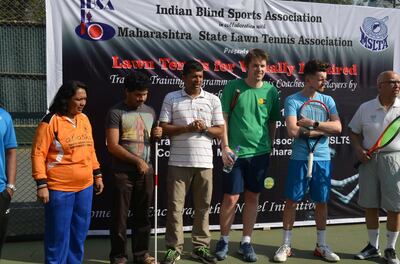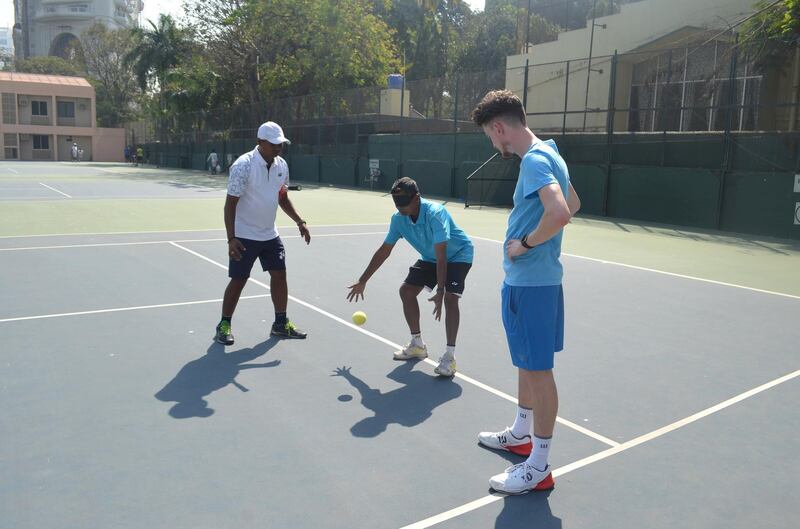"Ready?" Nibin Mathew shouts out to his opponent who is standing beyond the net on the tennis court. "Yes," comes the ringing reply, upon which Mathew enthusiastically bellows "play", while simultaneously hitting a soft, white sponge ball with his tennis racquet. His partner waits for the tinkling ball to bounce three times to gauge its position before hitting it back. In no time, the two blind men are involved in a rally.
Soundball tennis was Mathew's favourite weekend activity before the coronavirus pandemic hit. Every Saturday and Sunday, he'd play at the court of the Indian Institute of Technology Bombay. When he moved to Bengaluru for postgraduate studies, he kept up with his practice in that city.
Mathew's enthusiasm can be credited to Ekinath Khedekar and Tony Kurian, co-founders of the non-profit Happy Humans Foundation, which introduces soundball tennis to fellow visually impaired people. The organisation takes technical guidance from the International Blind Tennis Association. Since August 2016, it has familiarised more than 100 people with the sport through workshops and weekend games.

What is soundball tennis?
Soundball tennis is played on a smaller court that has a lowered net and tactile, string-taped baselines. Contestants have junior racquets fixed to oversize heads and use a sound-adapted tennis ball. The ball was designed by Japanese student Miyoshi Takei, who introduced soundball tennis in Japan in 1990. It is now played in several countries across the world, including China, Russia, South Korea and the UK. In India, the first national championship was held in Mumbai in February, with support from the Indian Blind Sports Association. Players are spread across the country, from Delhi to Hyderabad to Bengaluru.
Khedekar picked up soundball tennis during a study trip to London and was keen to introduce it to the blind community in India, starting with his home city of Mumbai. However, it is not easy to find a tennis court, Khedekar says. "They are few, expensive to hire and inaccessible. Many court authorities refuse to rent courts to blind people as they don't want to risk our safety," he adds, somewhat sarcastically. Somehow he managed to play once in a while with a group of five or six fellow enthusiasts.
Then in 2017, at an inclusive event, Khedekar, 35, met Tony Kurian, 30, a blind doctoral student at IIT Bombay and a Fulbright scholar, who was keen to solve the problem, given his own journey in the sporting world.

Kurian used to stay in a hostel for visually impaired children where sport was an annual activity and he got to “run a little”. However, play was off limits for the blind in the inclusive school Kurian attended in Thrissur, Kerala, and so he was sat inside the classroom “for safety”, while his friends got muddy on the playground.
Though he loved outdoor activities and even learnt cycling, Kurian gave it all up as a teenager. When his friends planned treks, he opted out because he didn't want to trouble anyone. "When you grow up blind, the tacit message is that these things are not for you," he says.
Growing up, Kurian became convinced that “disabled bodies are weak, ugly and incompetent”. After all, the bodies being celebrated in pop culture and in conversations around him were non-disabled, meeting too many unattainable standards. “As a person with a disability, I could never fit myself into dominant ideas about masculinity; I couldn’t even envisage myself going to a gym. Sports and fitness were not something I associated with,” he says.
As a blind person who has never seen himself, Kurian grew up with a negative image of his body; this had repercussions on his relationships. Then, five years ago, he happened upon inclusive adventure sports just when the genre was emerging in India. He met Divyanshu Ganatra, the first blind person in India to paraglide independently. Ganatra is the founder of the country's first inclusive-adventure sports organisation, the Adventures Beyond Barriers Foundation. Kurian was inspired by Ganatra's indomitable spirit and embarked upon many sporting adventures with the foundation. These paired him with non-disabled thrill-seekers, with whom he developed a deep camaraderie.
Kurian says he never believed he could run, but that was before he took part in an inclusive marathon. The foundation gave him the opportunity to pursue his childhood hobby of cycling again, on a tandem bike where the blind rider is steered by a sighted person. "Tandem cycling has become my top weekend activity now," he says.
Pushing his limits as part of a like-minded community, Kurian has done wall climbing, rappelling and rock climbing. As he realised his potential, he started to connect with his body in a positive way. "My feeble and fragile body started to seem active and lively to me," he says. "I became confident and developed the faith that my body could exist alongside other body types."
Tony to the rescue
Accordingly, when Khedekar introduced Kurian to soundball tennis, the two found in each other the like-mindedness they had always craved. Both wanted to break stereotypes about what blind people can and cannot do, to give their peers a taste of sport and to train them for a profession they might want to pursue. "I know what a great feeling it is when you sweat it out, hit the ball on the net and score a point," says Kurian. "I want everyone to experience that."

Once Kurian came on board, he spoke to the IIT authorities to permit other blind young people inside its premises to use the tennis court every weekend, on the grounds that he needed company to play. This regularised practice sessions for aspiring soundball players in Mumbai.
A liberating experience
A safe, familiar space also made the group self-reliant, to the point that they no longer needed an assistant to collect the ball or usher them in.
This February, Mathew, 26, won the Indian national championship of soundball tennis in Patiala, Punjab, beating 11 participants. "Tennis is very important to me. It has boosted my confidence, and keeps me in good physical and mental health," he says.
Before the pandemic, 20 visually impaired youngsters from Mumbai had become regular players. Some of them, Khedekar says, had never run before. "Blind people have restricted mobility, so when they start practising they are cautious and their movement is slow," he says. Vision plays a huge role in hand-eye co-ordination and body balance, so "initially everyone is worried about their safety. The tennis court gives them the freedom of mobility. Here, the only risks are the two net poles; otherwise, everyone is a free bird."
Khedekar says that regular practice boosts mobility and builds strong listening and orientation skills, which are helpful in all walks of life. "A lot of participants find the experience liberating," he says.
Kurian lists yet another advantage, one that walks the line between sport and socialising. “Now when someone is having a conversation about Federer and Williams, even the blind can participate in it.”






